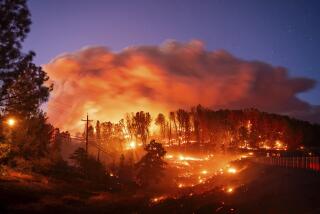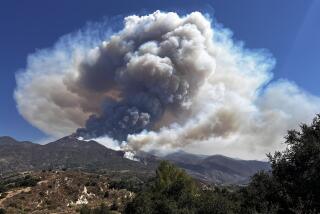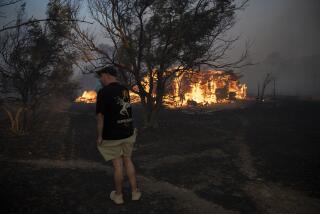Russian Officials See Shadows of Illegal Loggers in Forest Fires
MOSCOW â Bootleg loggers might seem to have no interest in seeing forests burn.
But in Russia, things arenât always as they seem.
As Siberia and the Russian Far East endure an unusually severe wildfire season, authorities right up to President Vladimir V. Putin contend that in many cases the blazes were set by timber poachers to aid or hide their thievery.
Unusually dry spring weather has contributed to the thousands of fires, which began in April and so far have devastated widely scattered areas totaling more than 6,600 square miles, including about 5,000 square miles of forest, according to the Emergency Situations Ministry. Besides the vast wooded taiga, areas of brush and grasslands also have been affected.
In the Far East alone -- which includes regions around Vladivostok, Khabarovsk and Blagoveshchensk -- authorities have counted more than 2,500 fires. Of these, 1,140 have been blamed on human action, either accidental or deliberate, while the causes of an additional 1,050 fires remain undetermined. Lightning ignited some of the blazes.
Putin charged at a recent news conference that âthere are reasons to believe that in some regions ... the fires were started deliberately either as a result of competition for control over forest or in order to create conditions for stealing timber or concealing these thefts.â
To successfully fight the annual conflagrations, the government must âcreate such conditions that will legalizeâ the timber business, Putin declared.
He offered no further explanation.
After the breakup of the Soviet state-run timber industry, logging is now dominated by large holding companies. Vast tracts of forest, however, are government-owned, and licenses are required for legal logging.
Even licensed loggers operate amid much murkiness about laws, rules and licensing procedures. The lack of clarity leaves room for unlicensed logging on a large scale, with poachers avoiding taxes and pocketing large profits.
The Tambov gang, a prominent Russian crime syndicate, is believed to play a significant role in timber exports, which totaled $4.5 billion in 2002.
The World Wide Fund for Nature has campaigned in recent years against illegal logging in Russia, which it charges is destroying habitats for the endangered Siberian tiger as well as lynxes, bears and wolves. The WWF has estimated that Russia loses about $1.5 billion a year in public revenue due to illegal logging.
Observers cite various ways in which arson fires can contribute to illegal loggersâ profits.
Ravil Geniatulin, governor of the Chita region, declared on NTV television that âof course factors of criminal interest are also present.â
One scheme, he said, involves the process of âsanitary logging,â done in areas where the underbrush or smaller branches have burned off but trees are still suitable for lumber. Areas where cutting had not been approved are often immediately reclassified for such logging if there is a fire, he said.
NTV added that in the Irkutsk region, timber gangs âare going about the business slightly differently.â
Bootleggers, according to the correspondent, need to divert forestry workers to fighting fires instead of preventing illegal logging.
âPolicemen near Lake Baikal admit that the arsonists almost always escape responsibility,â he said.
In recent weeks, about 7,000 people, 80 airplanes and helicopters, and more than 1,000 vehicles have been engaged in fighting the fires, according to the Emergency Situations Ministry.
âWe have a particularly hard season this year,â Sergei Zhurkov, chief of forestry resources for the Irkutsk region, said in a telephone interview.
âI must say that most fires, at least 80% of them, are caused by people and their carelessness,â he said. âOf course some fires must have been set deliberately to cover up misappropriation of timber and illegal lumbering. All such cases are thoroughly investigated, but it is extremely difficult for law enforcement to prove that a fire was set deliberately and with criminal intent.â
About 400 square miles of forest have burned in the Irkutsk region, Zhurkov said.
âWe combated the fires as best we could,â he said. âWe used planes and a lot of other equipment. Thousands of people from various organizations and local residents were enlisted to fight the fires. Fortunately, we had no loss of life.â
In a reflection of just how vast Russiaâs forests are, there have been very few reports of destruction of homes despite the extensive acreage already burned. No villages or houses have been lost to fire in the Irkutsk region, Zhurkov said.
Andrei Asharin, a natural resources official in Khabarovsk, said in a telephone interview that in his region eight houses were destroyed when a forest fire spread to the village of Bolon, 200 miles north of Khabarovsk.
In May, however, about 100 residents of forest villages in the Amur region were made homeless by one fire, the Emergency Situations Ministry reported.
Asharin said that to his knowledge no arson case in his region has made it to court this year. âNo one was caught in the act,â he said.
*
Times staff writer Sergei L. Loiko contributed to this report.
More to Read
Sign up for Essential California
The most important California stories and recommendations in your inbox every morning.
You may occasionally receive promotional content from the Los Angeles Times.










